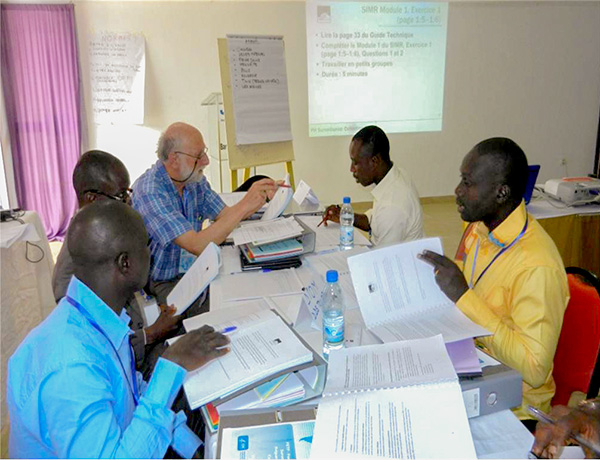Medical epidemiologist and Adjunct Associate Professor Eric Brenner pitches in to prepare Ivory Coast for potential Ebola epidemic
May 7, 2015

Eric Brenner leads a Ebola-preparation workshop
in the Ivory Coast.
Côte d'Ivoire (i.e., Ivory Coast) has yet to see a single case of Ebola. But its proximity to countries that have seen outbreaks, including those with shared borders (i.e., Mali, Guinea, Liberia), led the Centers for Disease Control and Prevention (CDC) to recruit bilingual experts to help prepare the vulnerable French-speaking nation for the possibility of encountering its own epidemic.
By leveraging its relationship with the Council of State and Territorial Epidemiologists (CSTE), CDC put out a call for a senior-level epidemiologist who could lead Ebola preparedness efforts for the Ivory Coast for six weeks. Eric Brenner, a retired medical epidemiologist with the S.C. Department of Health and Environmental Control and on-and-off Arnold School adjunct associate professor of infectious diseases since the early 1980s, was on the short list.
As one of few individuals who possess the necessary skills to assist with this effort, Brenner felt compelled to step up, but he also had a personal connection to the area. Brenner met his wife in the Ivory Coast when he was volunteering with the Peace Corps in the late 1960s. “I was from California, and she was from New York so we would likely have never met in the U.S.,” he says. In addition to his interest in revisiting the backdrop of their courtship and his international expertise in training preparedness for infectious diseases, Brenner was also drawn to the project for ethical reasons.
Getting out of the capital and working in the rural areas of the Ivory Coast highlights the resource inequalities between industrialized and developing nations. “What are the consequences for daily life when you don’t have running water or can’t access healthy food and medical supplies?” he asks. “What are the consequences for public health?” These inequalities, or “social justice” as he refers to them, combined with the Ivory Coast’s shared borders with two of the three most affected countries to date (i.e., Liberia and Guinea) put the Ivory Coast at higher risk for an Ebola epidemic.
Thus began Brenner’s recent journey. He started his endeavor with a week of preparatory briefings at CDC headquarters in Atlanta. He was then deployed to the Ivory Coast for six weeks where he engaged in a wide range of capacity-building preparedness efforts. For example, one week saw Brenner leading workshops for physician/epidemiology-nurse pairs of front-line staff from health districts that border Liberia and Guinea. The next week involved visits with representatives from the Ministry of Health, U.S. Embassy, Ebola Hotline Center and others. The training he provided was not just Ebola-specific but also focused on improving the surveillance system for the next epidemic—thus enhancing the Ivory Coast’s ability to detect and rapidly respond to threats either from long-recognized diseases (e.g., measles) or from “emerging diseases,” such as Ebola.
These experiences have led Brenner to reflect on some lessons learned from the Ebola epidemic as a whole. “This epidemic overall has shown that emergency response institutions of the world were not as robust as they should have been; it was slow coming and it was hard to organize,” he says. The world looked to groups, such as the World Health Organization and CDC, to lead the response effort, but these institutions are not necessarily emergency responders.
Brenner suggests that we figure out how we can best leverage expertise at the state level to assist the federal government in times of need. CSTE, for example, has grown in scope and membership over the past 40 years to provide technical advice and assistance to partner organizations, such as CDC. Brenner believes there is a need for other organizations, such as the Association of Schools & Programs of Public Health or the Association of American Medical Colleges, to serve in similar roles by developing a directory or on-call roster of specialized faculty and staff who could rapidly deploy in public health emergency situations.
In addition to doing his part overseas and musing about ways to improve future response efforts from a systems perspective, Brenner is also thinking about ways he can help prepare future public health experts. As an instructor at the Arnold School, he teaches a survey course on infectious disease epidemiology at least once per year. In addition, Brenner has been known to create more specialized courses based on actual epidemics (e.g., a 2010 course on influenza after the 2009 swine flu outbreak). Up next? It might just be a course that focuses on Ebola.



_01.jpg)
_02.jpg)